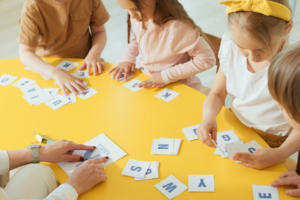
What is a Child Study Team and How Can It Help?
 While it may sound somewhat ominous, your school’s Child Study Team is actually a wonderful resource to help you navigate the sometimes rough waters of academics. Let’s talk about what this dynamic team can offer you and your student.
While it may sound somewhat ominous, your school’s Child Study Team is actually a wonderful resource to help you navigate the sometimes rough waters of academics. Let’s talk about what this dynamic team can offer you and your student.
First off, what is a child study team? At most schools, this group of valuable professionals consists of an educational psychologist, learning disabilities specialist, social worker, counselor, and speech/language pathologist. While this can vary by school, these are typically the essential components put in place to help the struggling student.
So what does this team do? When it comes to learning disabilities and other academic challenges, it’s important to have seasoned professionals at your disposal, and that’s just what you have in the child study team. Two essential duties of the team are evaluation and consultation. In order to diagnose a learning disability or processing issue, you need professionals like psychologists who can evaluate a child’s situation. Then, you need professionals like counselors and specialists to offer prescriptive solutions to help the student. From beginning to end, from evaluation to solution (for example, an Individualize Education Plane (IEP), the child study team can help you every step of the way.
Now that you know what this valuable collection of pros does, when should you reach out to them? Academic challenges can arise seemingly out of nowhere. Just as things are moving along smoothly, a student can begin to struggle or fall behind. While this can be very alarming for parents, the reality is that situations like this are exactly why child study teams exist. If, as a parent, you notice your child beginning to have some difficulties in class, don’t hesitate to reach out to the team. They can help you figure out where to start and how to navigate moving forward. Parents sometimes feel alone when their students are having a hard time, but it’s worth remembering that these folks are available to you as soon as you need them.
Ok, so now maybe you’re wondering does this mean my child is behind everyone else? The answer is a resounding no. Just because you’ve employed the assistance of your school’s child study team, this does not in any way, shape, or form mean that your child is now doomed to always be behind in school. Of course, stigma surrounding academic struggling exists, but these school professionals are trained not only to help with the nuts and bolts of the situation but also with the emotional component. These educational experts possess a deep understanding of the stress and anxiety attached to struggling in school.
Speaking of which, maybe you’re wondering what does each team member do? Let’s explore each role more closely:
Educational Psychologist: More specialized than a general psychologist, the educational psychologist is an expert in how children learn. This understanding allows this professional to analyze what is impeding a student’s learning and to begin making an assessment, which can lead to considering what options are available to help the student. Educational psychologists are also deeply attuned to social and emotional learning, and therefore are able to understand the student on much more than a purely academic level. This valuable team member is often the starting point for students who are beginning to struggle.
Learning Disabilities Specialist: Also a highly specialized team member, this person will possess an intimate knowledge of how learning disabilities (LDs) manifest, and how best to teach those students who struggle with them. This deep understanding of LDs will help the specialist to pinpoint learning problems for an individual student and lay out an effective course of action for teaching in a way that works for that student.
Language/Speech Pathologist: Sometimes academic problems are the result of communication difficulties. For students who are struggling with language and speech, this professional is a highly specialized expert who can help assess, diagnose, and treat students facing communication hurdles. Support with communication can help in all areas of learning, even those not explicitly related to language.
Social Worker or Counselor: These individuals are experts in understanding the more emotional side of things. Social workers are skilled at being empathic and understanding, allowing for a great relationship with students to help them with the other struggles that go with academic obstacles.
Great, but how does the team coordinate everything? It can seem somewhat confusing when you’re dealing with a number of different people at your school. The good news is that this team is just that: an integrated collection of members who work with one another to create the greatest benefit for the student. They will be in contact with one another and accessible to you throughout the process.
If you feel your student could use some support, keep your school’s child study team in mind as an option for helping. Often times, school is not a “go it alone” proposition: students and their family need help. Reaching out to community and school resources is key to setting up students for success.
Written by Phil Lane
iAchieve Learning is now offering educational and intellectual testing to our list of services in order to better serve our clients. We have partnered with clinical psychologist Dr. Kati Guada to perform a range of assessment measures and write integrated reports with specific recommendations based on our students’ individual needs.
RELATED POSTS
How Diet, Exercise, and Sleep Affect Brain Power



